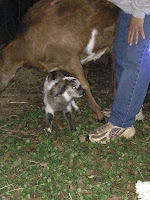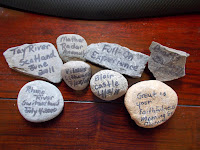"Speak Sweetly! So That, If Ever You Have To Eat Your Words They Don't Taste Bad..."
"Think twice before you speak, because your words and influence will plant the seed of either success or failure in the mind of another." Napoleon Hill (Courtesy of Brainy Quote)
Lynne and I were the recipient of some books (electronic format) on how to learn to speak Chi-Tonga, the language of the Zambians around NDO. Often when people are learning to speak a new language they are cautious in the words they use for fear they may offend someone or make a mistake. We have learned that it is in venturing to speak the language at every opportunity that we deepen our understanding, sharpen our language skills, and learn to laugh at ourselves. In the many countries I have visited the recipients of my "mis-speaks" have been forgiving, understanding and helpful. They seemed to sense that in trying to speak the language my intent was honest, and so any mistakes were honest also and not meant to offend.
You are wondering what language feaux pas I have made? I wrote in my blog about teaching at NDO for church and using the word mbobo (which means "there it is") when I meant to the Chi-Tonga word for "you are welcome." I can't bring it to mind even now. Blu Tidwell was translating for me, and I can clearly remember him looking at me and saying, "I don't think that is even a word in Tonga!" We all had a good laugh.
When our landlord came to our rental house in Spain to review the utility bill with us, she entered a house that was scattered with children's clothes. Lynne's sister, Connie, had sent her some boys clothes for Stephen. Our landlord spoke only Spanish, but her daughter spoke Spanish and English. My intent was to explain the clothes away by saying "chico" for "little boy." I opened the front door with a flourish, swept my arm dramatically and proclaimed "cochinos" which is "pigs" in English. The daughter burst out laughing and the mother looked shocked. Lynne was standing behind me and said, "congratulations, you just told the landlord we are pigs!"
So what is my point. I wonder how often we measure our words for their intent, their impact and how they are received. Do we really? I agonized over a response to an e-mail at work one day because my short response could be construed as rude or disrespectful. I sent the e-mail and then immediately went to the person to explain what I meant (no emoticons when sending e-mails to superiors). Her response spoke volumes about her character, because she told me, "I knew you would come talk to me about it! No problem!"
But what about the things we say in passing or as we "cruise by" someone. I call them "drive-by" conversations, because they are often similar to drive-by shootings. This is especially risky if you are not facing the person you are addressing, or are passing behind them when you say it. When someone is doing a drive-by it is difficult to read expression, body posture, and most often intent. I have to admit ruminating over words someone said to me in passing, and reflecting on what could I have said to deserve what they said. It is entirely possible it was an innocent comment, or spoken in jest. However, with no facial expression or body posture to accompany it, translation is difficult.
James 1:19 encourages us "to be quick to listen, slow to speak and slow to become angry." I have really become aware of being quick to listen, slow to speak and slow to become angry during conversations, or when someone says something that I am not sure how they meant it or how I should take it. The higher road is to assume they meant the best, the easy way to jump to the conclusion that they meant the worst. The difference is in how I let their words affect me. Even if they meant the worse, they have given me an opportunity to show them the same grace that I have received and continue to receive from my Heavenly Father.


Comments
Post a Comment